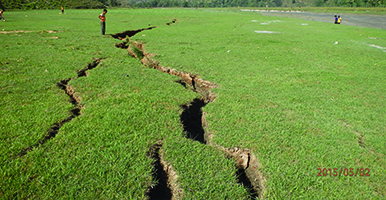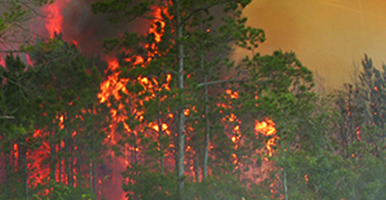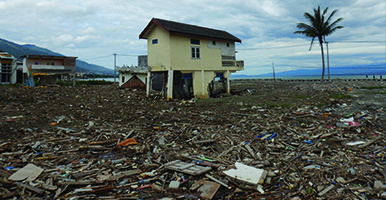Western-ICLR Multi-Hazard Risk and Resilience Workshop

Areas of Canada are at risk for disasters and catastrophes associated with a variety of natural hazards: Earthquakes pose a risk to major urban centers; Floods are a common occurrence across most of Canada including urban and coastal zones; Wind storm, hail and freezing rain events damage properties and infrastructure and interrupt public utilities; Wildland fire seasons are becoming longer and more intense, threatening people and properties in the wildland urban interface and causing health concerns due to smoke transport across expansive areas.
There is a critical need for not only the scientific understanding and quantification of the risks that arise from natural hazards, but also the translation and transfer of that knowledge to end-users in government, industry and communities to better inform public policy and develop insurance plans. Western has been a leader at the forefront of fostering scientific research in natural hazards. The recently created Multi-Hazard, Risk and Resilience Group through the Interdisciplinary Development Initiative (IDI) Program, gathers researchers from different Departments and Faculties at Western. A multi- and interdisciplinary research-driven group that aims to address national and global challenges related to disaster risk reduction against natural catastrophe, with people from the Departments of Earth Sciences, Statistical and Actuarial Sciences, Civil and Environmental Engineering, and Geography. At the same time, the Institute for Catastrophic Loss Reduction (ICLR) has long acted as the bridge between curiosity-driven discovery-focused research and the insurance and homebuilding industries, government and local municipalities, and the public.
The 2019 Western-ICLR Multi-Hazard Risk and Resilience Workshop brings together researchers from different disciplines who are studying flood, wind, earthquake, wildland fire, and hail, and engage key stakeholders from government/municipality and industry. It will provide a forum to discuss these risks and how they relate to these end-users. This workshop will expose researchers to tools and ideas used in other disciplines for a variety of natural hazards and will help identify potential multidisciplinary teams to collaborate directly on high-impact research problems related to natural hazard risk assessment.
Related Invitations
ICLR Round Table & Workshop "Communities Addressing Climate Change Adaptation and Disaster Risk Reduction Together"
Disaster risk depends on the hazardous events (floods, storms, tornadoes, heat and others) and the exposure and vulnerability of the communities that are impacted. There is need to reduce communities’ exposure and vulnerability and enhance the capacity to recover, being more resilient. Knowledge and information on the changing hazards on time scales from now to the next few decades will help enable designing and building more resilient communities and providing information and warnings of impending events to reduce deaths, injuries and societal impacts.
Bringing together practitioners from across municipal and regional governments with science-engineering and policy experts, with strong multidisciplinary engagement, will enable identification of co-beneficial opportunities. Understanding local needs and the availability of information and its accessibility and most effective use it and how this feedback can lead to reduction in disaster impacts will be outcomes.
Date: November 6, 2019: 9:00 am
Location: ICLR Boardroom in the Amit Chakma Engineering Building, Western University
Workshop supported by American Geophysical Union Spilhaus Ambassador Award Grant
Contact: Professor Gordon McBean, ICLR and Western University, gmcbean@uwo.ca
By invitation only.
Earthquake Risk Modeling in Canada: From Knowledge to Action
Insights gained through quantitative earthquake risk modeling are foundational to seismic design and disaster risk reduction planning at all levels of decision making. OpenQuake is a collaborative earthquake hazard and risk modeling platform developed by the Global Earthquake Model (GEM) Foundation. Canada joined the GEM Foundation as a public sector partner in 2017 and is working with researchers and practitioners from across the public, academic and private sectors to advance capabilities for catastrophic risk modeling and to co-develop a National Earthquake Risk Profile that will establish a base of evidence to help inform and empower disaster resilience planning initiatives in the public domain.
Join us at Western University in London, Ontario on November 6th and 7th for a 2-day modeling workshop to explore analytic capabilities and use of the OpenQuake Platform for the analysis of earthquake risk and the evaluation of risk reduction strategies. The workshop is co-hosted by the Geological Survey of Canada, the GEM Foundation, the UWO Good Vibrations and Excitations Laboratory and the Institute for Catastrophic Loss Reduction. Training sessions are designed for risk modelers working in areas of both fundamental and applied science — and practitioners who are interested in using outputs of risk assessments to inform disaster resilience planning at local and regional scales in Canada.
Date: November 6 - 7, 2019
Location: Physics and Astronomy Building, Room 148, Western University
Registration: Through Eventbrite
More Information: Open Quake Flyer (PDF)





